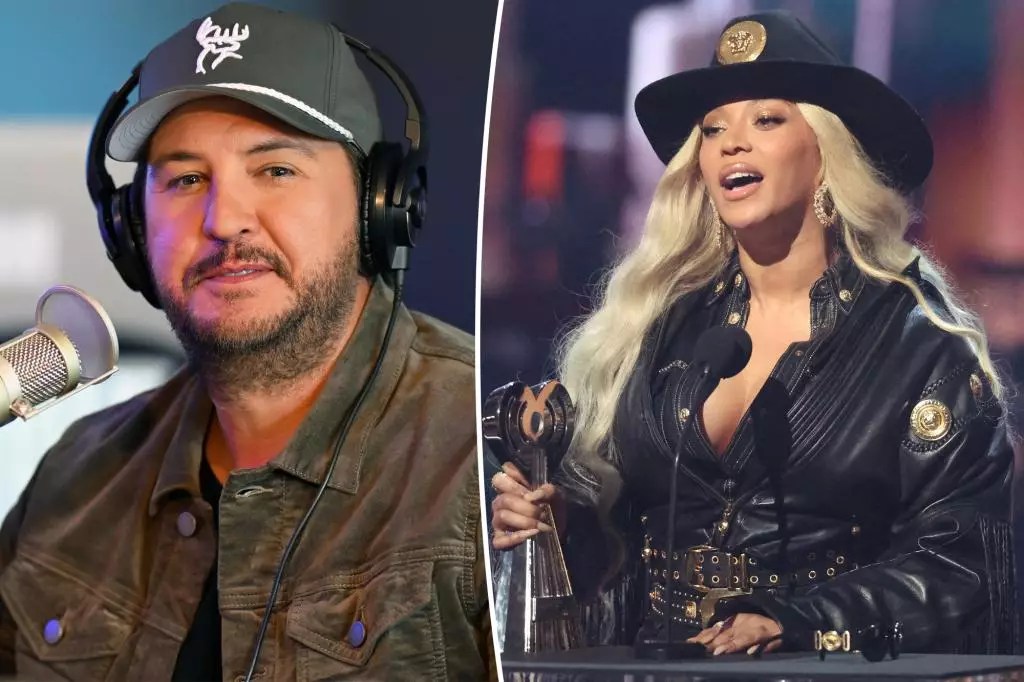In a recent dialogue that sparked significant debate in the country music community, country singer Luke Bryan discussed the surprise exclusion of Beyoncé from the Country Music Association (CMA) Awards nominations. Despite the overwhelming success of her debut country album, “Cowboy Carter,” Bryan pointed to the complexities that arise when an artist from a different genre attempts to enter the country music scene. His comments underline a broader conversation about what it means to be part of a genre that has traditionally held fast to its roots while also navigating commercial pressures and the desire for inclusivity.
Bryan’s remarks were nuanced; they acknowledged Beyoncé’s monumental influence and her right to produce music across genres. However, he emphasized a sense of community that is deeply ingrained in country music. “Come into our world and be country with us,” he stated, illustrating the expectation for artists to not only create within a genre but also to engage with its cultural fabric and community. This sentiment raises questions about the balance between musical freedom and the expectations of genre affiliation that can sometimes stifle artistic expression.
Beyoncé’s venture into country music isn’t merely a genre shift; it represents a complicated navigation of cultural identities and expectations. Country music has often been seen as a close-knit community, where artists are expected to demonstrate loyalty and authenticity to their roots. This idea of community was echoed by other artists as well, including Dolly Parton, who defended the CMA voting process by noting the plethora of established country artists who compete for recognition. Parton posited that the voting committee is often faced with difficult decisions on artistic integrity versus the influx of new talent.
Bryan’s own comments illustrate a tension faced by many artists when new names emerge from outside the expected sphere. While he appreciates new influences entering the genre, he urges these artists to fully engage with the country music community. This perspective prompts a vital inquiry: What does it mean to authentically participate in a genre that often measures participation against historical performances and established norms?
Another layer of complexity is introduced when considering the fervor of fanbases, such as Beyoncé’s devoted followers, the Beyhive. Bryan touched upon the passionate response from her fans regarding the CMA nominations, illustrating the challenging dynamics that arise when different genres collide. The fierce loyalty exhibited by Beyoncé’s fans raises questions about how fanbases can sometimes create friction between musical communities. The challenge lies in reconciling this intense support with the traditionalist views held by certain factions within country music.
Complicating matters further, fellow artist Kelly Clarkson shared her experience of being pushed towards exclusively country music, highlighting how artists are sometimes pigeonholed into particular genres despite their broader artistic aspirations. Clarkson’s reflections remind listeners that the boundaries of genre often restrict the very essence of musical exploration, and that many artists experience similar hurdles in their careers.
Understanding the Bigger Picture
Beyoncé herself has reflected on her experiences within the country music genre, sharing that her journey has been marked by both exclusion and exploration. In her discussions about the creation of “Cowboy Carter,” she emphasized the deep dive she undertook into the roots of country music and acknowledged the challenges she faced along the way. This sentiment speaks volumes about the struggles artists endure when working to create a body of work that resonates with their identity while simultaneously gaining acceptance from established communities.
Ultimately, the conversation around Beyoncé and the CMA nominations extends beyond individual accolades; it delves into the ongoing evolution of musical genres, the role of community, and the intricate balance of creative freedom against the backdrop of tradition. As the music industry continues to evolve, the necessity for cross-genre dialogue becomes increasingly evident. Artists like Beyoncé not only challenge existing norms but also pave the way for new understandings of what it means to be part of a genre, urging a re-examination of expectations and inclusivity within the music landscape.
As these discussions unfold, it will be critical for both artists and audiences alike to embrace the fluid nature of music and recognize the opportunities that arise when genres intersect, ensuring that the evolution of music remains a vibrant tapestry of diverse influences and voices.


Leave a Reply